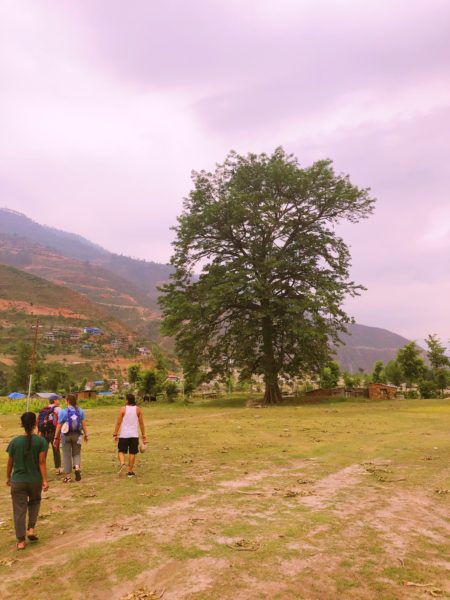“People” trees
After a few hours in Nepal, it’s obvious that trees hold a different level of importance here than they do in the S tates. Whether walking through the village or passing on the bus, you will see trees wrapped in string, protected by cages, surrounded by cement platforms and occupied by people. Peepal, pipal, sacred fig tree, Bodhi tree whatever you choose to call it, a specific tree is treasured here. Regardless of the strong Hindu influence in every crevice of Nepal, Buddhism and the Bodhi tree are mashed into the country aswell. You might have heard about the Pipal tree in the story of Buddha reaching enlightenment known as Bodhi, of course with nearly everything here holding spiritual value, this tree is no different.
tates. Whether walking through the village or passing on the bus, you will see trees wrapped in string, protected by cages, surrounded by cement platforms and occupied by people. Peepal, pipal, sacred fig tree, Bodhi tree whatever you choose to call it, a specific tree is treasured here. Regardless of the strong Hindu influence in every crevice of Nepal, Buddhism and the Bodhi tree are mashed into the country aswell. You might have heard about the Pipal tree in the story of Buddha reaching enlightenment known as Bodhi, of course with nearly everything here holding spiritual value, this tree is no different.
Hindus also find significance in the sacred fig trees, Pradakshina or meditative pacing is done around the tree, usually 7 times in the morning as a form of worship. However, not all Pipal trees can bare the name Bodhi. In order for a tree to be called a Bodhi tree it has to first be traced to a parent Bodhi tree and continuing on until it is traced to the tree in which Buddha actually sat under.
These magnificent trees are protected by the government and cherished by the people here. Near them, you will find people gather, enjoying their shade, sharing in conversation, finding rest and passing the time. Communities gather here, babies and grandparents, kids and couples take a break from their lives to just sit and be. In villages where everyone is known, the Pipal tree is the only social network available.
As I also sit and enjoy the calmness, I think about how my phone and every other phone in America contains billions of “People trees”. My connection to the outside world is so expansive, I could be in contact with someone halfway across the world (and have) within seconds of picking up my device. But here, it’s almost outlandish to do so, do I need to check Instagram 500 times a day? Here in Nepal, they would disagree with our Western pace, and I’m grateful for that. Andrew Root explains stating “Globalization has made us all travelers across time and space.” It’s mind blowing that less than 30 years ago, our society has skyrocketed into a world more connected than it ever has been before. We are capable to search Google for the most obscure information and learn all there is to know about a topic without even leaving our bed. In a way, it’s incredible, humans are more informed and independent than ever, in another way it’s devastating.
We have escaped the age of engaging with each other and spend hours of our day engaged in solitude, scrolling and searching and desiring things we do not have. Time flies by as we disconnect from the world around us. Looking up at the enchanting, towering tree, I am thankful that cell service is limited here and that I also can disconnect. For the first time, I’m not rushing to see the next Facebook post or compare summers, time slows down.
https://en.wikipedia.org/wiki/Ficus_religiosa#Buddhism
The Youth Ministry Mission Trip as Global Tourism: Are we OK with this? by Andrew Root
